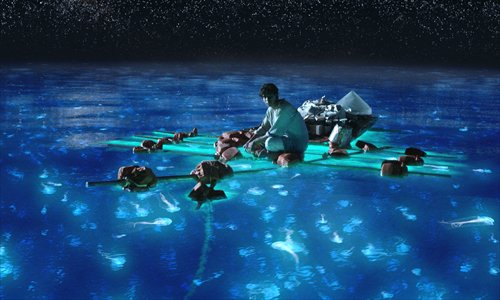Easy As Pi

A day after its November 22 China premiere, director Ang Lee's Life of Pi drew a prolonged hush among its capacity audience at Wanda Plaza's IMAX Theater in Chaoyang district. Aside from the odd cinemagoer adjusting a pinching pair of 3D glasses, the theater's audience remained transfixed throughout the film, Lee's 13th, based on the 2002 Man Booker Prize-winning novel by Yann Martel.
The film has been given a fleeting week-long IMAX run in the country to ensure it doesn't steal the glory of domestic winter blockbusters. After this, it will screen for one more week in 3D at regular cinemas.
If the Chinese proverb "crouching tiger, hidden dragon" - the inspiration behind Lee's namesake 2000 wuxia blockbuster, meaning "undiscovered talent" - has any import with the demanding public, Life of Pi proves the Taiwan-born director has plenty of tricks still up his sleeve.
The opening credits present scenes of breathtaking wildlife, a theme running throughout much of the film in a disarmingly vivid array of colors.
Viewers' eyes already twinge before they properly enter Lee's world, which dwarfs what we thought we knew in a kaleidoscopic current towards disaster and exquisite wonder.
Pi, or Piscine Patel, an Indian youth played by newcomer Suraj Sharma, grows up in the French colony of Pondicherry believing in God yet seeking to know the soul of all living things. His open search for divine truth unsettles his reasoned father, a business-driven zoo owner.
Pi's spiritual quest is tested, however, when a Japanese freighter taking him and his family to Canada sinks, dragging all four along with the zoo into the Pacific Ocean. Pi eventually escapes in a lifeboat, together with a zebra, hyena and orangutan named Orange Juice.
The teenager soon discovers Richard Parker, a tiger, unexpectedly managed to stow aboard after the sinking.
By building tension between Pi and Richard Parker, Lee's use of the first-person viewpoint places viewers squarely in the young protagonist's shoes.
The story itself is never as adrift, as periodically the film reverts to scenes where an anonymous author (Rafe Spall) listens to the older Pi (Irrfan Khan) recount his journey years later.
The film's stunning effects remind viewers of existential themes at play, yet none are ever executed with a view to being crudely symbolic or, worse still, hypnotic.
The most notable coo from Friday's audience was that shortly following Pi's entrance into a second storm at sea when his lifeboat sits in perfect symmetry to a ruby sky.
Importantly, Life of Pi isn't screened in 3D purely for the sake of it. Lee's direction of one scene in particular - a tense lifeboat tussle between Pi and Richard Parker - shows how well the technology can work when centered on a 360-degree axis from which neither characters, nor the audience, have any means of escape.
Though the film might not please Lee fans used to the director's trademark gritty adaptations, he delivers an engaging adaptation of a widely believed "unfilmable novel."
In Brokeback Mountain (2005), Lee third-wheels viewers on a painful journey of two suppressed homosexual wranglers in Wyoming. In Life of Pi, he reintroduces this tender suspense between characters - boy and beast - as they struggle for placid coexistence.
As readers will attest, Martel's novel tells two stories that should be cherished equally for what they represent, rather than what they contain.
Admittedly, this is where the film stumbles - its inability to make sufficient impact by revealing what lies beneath appearances in Pi's tale.
The film's flow is strong enough to keep audiences sluggishly resisting Lee's tide of visuals.
But to discover the heart of Pi's story, viewers must first suspend disbelief, and then suspend belief in all that is seen.
Suffice to say Lee might have sidestepped this issue had his 2003 superhero flick Hulk marked his debut break into cinema's fourth wall.
Then again, what a shame it would have been had he blown all that beguiling wizardry on a raging mutated humanoid monster.